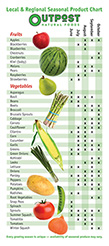Pollinators
Providing wildflower-rich habitat is the most significant action you can take to support pollinators. Adult bees, butterflies, and other pollinators require nectar as their primary food source, and female bees collect pollen as food for their offspring. Native plants, which are adapted to local soils and climates, are usually the best sources of nectar and pollen for native pollinators. Incorporating native wildflowers, shrubs, and trees into any landscape promotes local biological diversity and provides shelter and food for a diversity of wildlife. Most natives require minimal irrigation, flourish without fertilizers, and are unlikely to become weedy.
This fact sheet features regional native plants that are highly attractive to pollinators and are well-suited for small-scale plantings in the Great Lakes region, which includes Ontario, Minnesota, Wisconsin, Ohio, Michigan, Pennsylvania, and New York.
.jpg)
To download the full FACT SHEET click this link.
And here's an interesting article about Christine Goldsworthy, our exceptional gardener who tends to all of our plants: https://bayviewcompass.com/shes-unpaved-parking-lots-planted-a-paradise/








